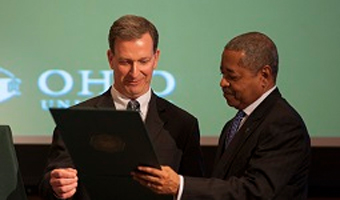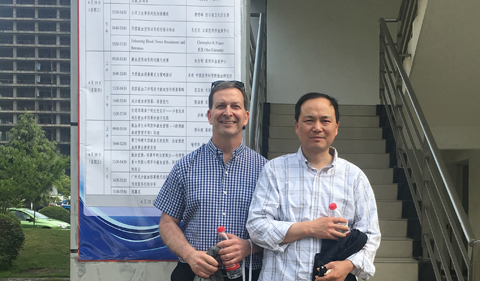By Bethany Venable
From Compass
In keeping with a revered tradition that spans more than 55 years, Ohio University community members gathered Tuesday evening to honor 2014 Distinguished Professor Christopher France during the annual Distinguished Professor Lecture and official portrait unveiling.
President Roderick J. McDavis opened the event, recalling the history of this award that marks Ohio University’s highest honor for faculty members.
“It was during President Emeritus John Calhoun Baker’s tenure that the Distinguished Professor award was established by Edwin and Ruth Kennedy,” said McDavis. “Their intention was for the Distinguished Professor award to be a truly important incentive in furthering the high-quality education at Ohio University.”
McDavis invited Tom Carpenter, 2013 Distinguished Professor, to the podium to offer the introduction of France. France, a professor of psychology at OHIO, has been a member of the faculty for 25 years. During that time, he has been recognized for his outstanding research and teaching, named a Presidential Research Scholar (2001-05) and was also named the College of Arts & Sciences Dean’s Outstanding Teacher in 2013.
Working to Blood Donor Agencies
Carpenter offered the audience insight into the work France has performed to aid blood donation agencies in cultivating donors through his research on the psychological and physiological factors of blood donation.
“Blood banks were puzzled and deeply concerned about the lack of repeat blood donations. Working with public health officials and blood donor agencies, Professor France developed simple and effective interventions based on rigorous experimental design in alleviating this problem,” explained Carpenter. “Letters of praise from outside of academia for this work are moving, pointing to that happy union of the theoretical and the practical for which we all strive.”
A short video, produced by University Communications and Marketing, played before Carpenter invited France to the podium. The video highlighted France’s reflections on his work at OHIO, his interests outside the classroom and his research, and his reaction to receiving the Distinguished Professor award.
Following the official unveiling of the Distinguished Professor portrait, France addressed the audience in the Baker Ballroom for his lecture, titled “Rolling up Our Sleeves: Working to Prepare Blood Donors for a Lifetime of Giving” and began by expressing his thanks. France said reflecting on his emotional response in the video allowed him the time to fully appreciate what the Distinguished Professor honor meant to him.
“Gratitude in the most obvious sense, but more importantly in the broader sense, for the people who have helped shape my career. I want to say thank you to the mentors I’ve had and the great collaborators and colleagues I’ve had at OHIO, and to my students, both undergraduate and graduate,” said France.
Don’t Be Scared to Give Blood, Says France
France focused his lecture on the question he’s been grappling with for most of his research career: what deters initial and repeat blood donors? France pointed to possible media influence, showing a clip from the sitcom The Office in which a main character donates blood and then faints.
“The idea of having a reaction is shown to be anxiety producing in both first time and repeat donors,” said France. But, he explained, huge proportions overestimate the likelihood of having a reaction.
France expressed his gratitude to the Community Blood Center of Greater Kansas City for allowing him and his fellow researchers to study the effects of fear and reactions to blood donation. It’s rare to be allowed to interview donors, he said, because blood banks are concerned about the effect asking about anxiety might create.
“They don’t want to ask because they think asking will elicit the response,” said France.
Over the course of his three-part presentation, France described some of the physiological and psychological responses that can take place during a blood draw, and the methods he has studied and implemented to help alleviate these responses. He even joked with the audience that perhaps by sharing this information, he might encourage hesitant potential blood donors to overcome their fear.
It remains to be seen if a surge in Ohio University blood donations will take place following France’s Distinguished Professor lecture, but even without that data, the impact of his teaching and the outcome of his dedicated research can be measured by the long-lasting and beneficial effects on blood donations worldwide.




















Comments